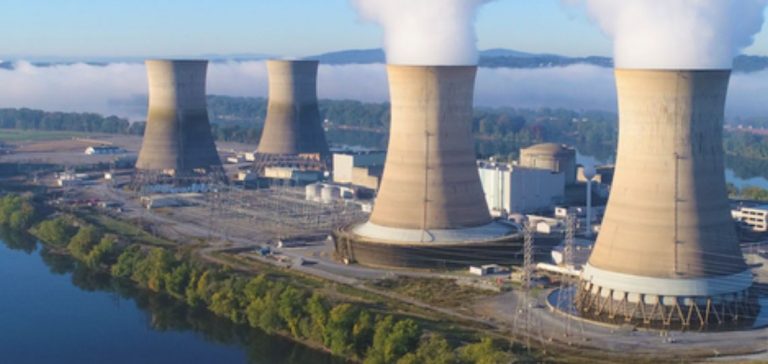At Climate Week in New York, fourteen leading financial institutions expressed their support for tripling global nuclear power capacity by 2050. This announcement echoes the Declaration to Triple Nuclear Power, launched at COP28 in Dubai in 2023.
Banks and investment funds recognize that nuclear power, as a complement to renewable energies, is crucial to achieving global decarbonization targets. The inclusion of nuclear power in discussions on energy transition represents an important turning point.
Indeed, these financial institutions emphasize that nuclear power offers a reliable source of low-carbon electricity, helping to stabilize energy grids while reducing greenhouse gas emissions.
Among the banks involved in this initiative are Barclays, Morgan Stanley, BNP Paribas and Société Générale.
These establishments emphasize the need to develop new financial tools to support nuclear projects in the development phase.
Financing nuclear expansion
The financial requirements for the development of new nuclear infrastructures are considerable.
The high cost of projects, combined with regulatory complexity, is still holding back large-scale deployment.
However, Climate Week participants stressed that traditional financial mechanisms must evolve to support this strategic sector.
They believe that government-backed loans and risk-sharing mechanisms could make nuclear projects more attractive to investors.
For financial institutions, the challenge lies in mobilizing long-term capital and creating suitable financing models.
Sweden’s Energy Minister, Ebba Busch, has outlined her government’s proposal for guaranteed loans, Contracts-for-Difference and risk-sharing schemes to accelerate the construction of new power plants.
These initiatives aim to make nuclear power competitive with other low-carbon energy sources, while meeting the growing need for electricity.
Growing demand
The acceleration of the energy transition requires us to meet a growing demand for electricity, particularly with the development of new technologies such as artificial intelligence and data centers.
These sectors require reliable and abundant energy, which makes nuclear power a preferred solution for meeting these needs without increasing CO2 emissions.
The role of banks in this energy transformation is fundamental.
Leaders at Climate Week stressed the need to develop partnerships between the financial sector and energy companies to facilitate the financing of long-term nuclear projects.
Financial players must collaborate with energy producers, regulators and governments to create favorable environments for investment in nuclear power.
A favorable political framework
In addition to the financial aspects, speakers also stressed the importance of a clear policy framework to encourage the development of nuclear power.
Many countries, including France, Sweden and the United States, have already integrated nuclear power into their decarbonization strategies, recognizing its central role in stabilizing power grids and reducing emissions.
These countries are exploring new ways to make the nuclear sector more competitive, notably through regulatory reforms and financial incentives.
Discussions around the financing and regulatory framework for nuclear power are taking place against a backdrop of strong demand for low-carbon energy solutions.
With global targets set for reducing greenhouse gas emissions, the nuclear sector presents itself as a key solution for supporting the energy transition without compromising security of supply.
Growing international support
The initiative to triple nuclear capacity is enjoying growing international support.
Twenty-five countries have already endorsed the Declaration to Triple Nuclear Power, including Japan, the UK, Poland and Canada.
These nations recognize the importance of mobilizing funding to make nuclear power competitive in the long term, while respecting the objectives of the Paris Agreement.
Discussions around this nuclear expansion are also supported by private sector players, particularly in energy-intensive industries.
For these companies, access to reliable, low-carbon electricity is essential to ensure their global competitiveness.
Leaders at Climate Week agreed that the development of new reactors and the modernization of existing infrastructure are crucial steps towards achieving the 2050 targets.
By combining public and private financing, nuclear projects can become viable on a large scale, supporting the energy transition.






















